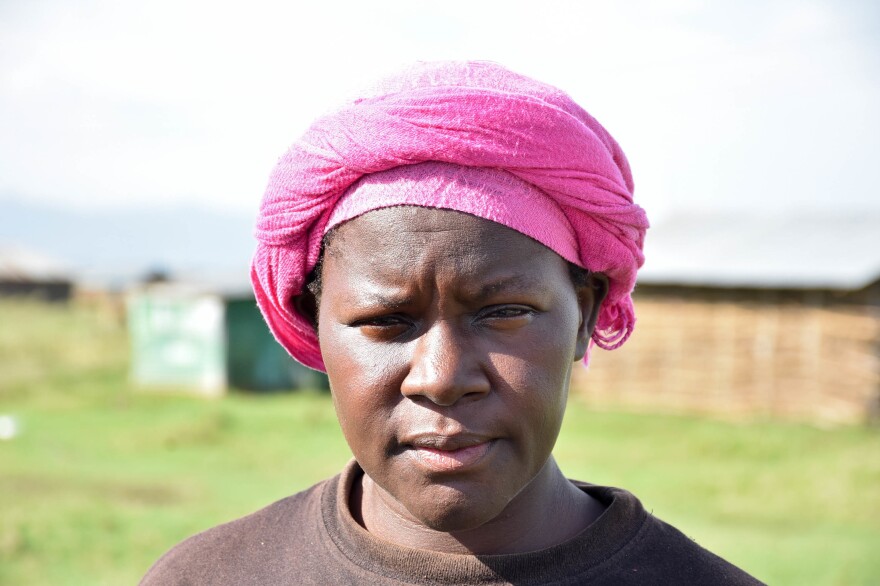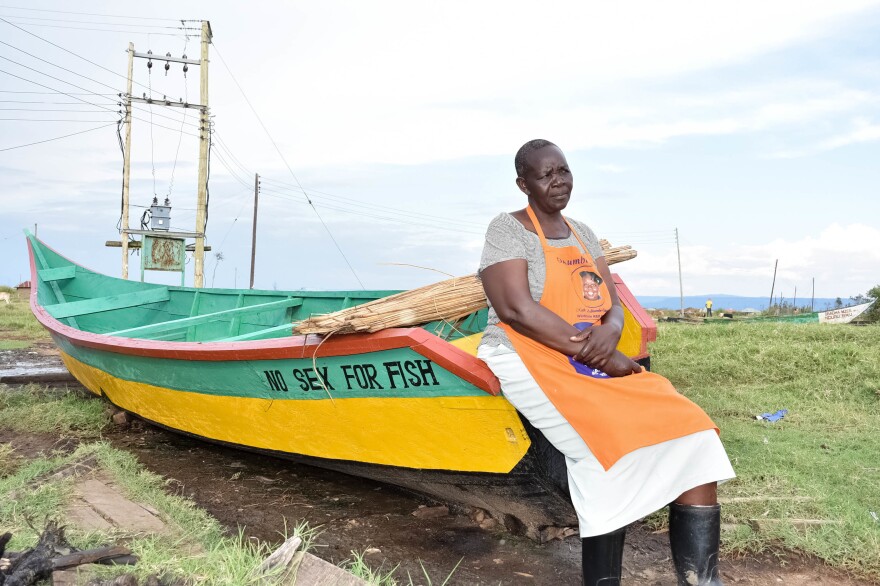When an NPR team met Justine Adhiambo Obura in the fall of 2019, she wore a turquoise t-shirt with a bold message: "No Sex for Fish."
It wasn't just an eye-catching slogan. It was a summation of the indignities women faced in her world — and how they flipped the power dynamic.
In a number of lakeside communities in Africa and other parts of the world, men do the fishing and women sell the fish. For many of the women, living in poverty and with minimal education and a lack of job opportunities, there was no other way to earn a living, to support their children.
As supplies of fish diminished in various locations, fishermen began demanding sex in exchange for providing a woman with fish to sell. That was the case in Nduru Beach on Lake Victoria, where Obura lives. A lot of the fishermen were HIV positive and infected the women. The women hated this practice of transactional sex but many felt they had no choice. "I exchange sex; I get fish," Mika Onyango, a mother of six, told us. "I don't care about getting HIV. Me, I need fish. I need earning to sustain my family."
In 2011 Obura and others came up with a game-changing idea. What if they owned their own boats – and hired men to fish for them? With the help of a couple of Peace Corps volunteers and a series of grants, they started the No Sex for Fish cooperative. Eventually, Nduru Beach and eight other area villages got boats – around 30 in total. The women of Nduru Beach not only earned a living but built up a sizeable rainy day fund – some $6,000 – which they donated or loaned to members facing financial stress.
Then came an unprecedented series of rainy days. In early 2020, Lake Victoria rose and flooded Nduru Beach. The 1,000 or so residents fled to safety. They abandoned their homes; many of them had no alternative but to live in improvised shelters at local schools. They had no personal savings – and for the women of No Sex for Fish, no way to make money. These women – some of them single mothers, some of them HIV positive – saw most of their boats lost or damaged beyond repair. The money the group had saved over the years enabled them to weather these dire times.
Some former fishmongers turned to farming. In nearby Kusa Beach, which had a chapter of No Sex for Fish, a tomato project looks promising. Obura and some of the women of Nduru Beach tried agriculture too. It didn't work out for them.
Eventually the waters of the Lake receded and the Nduru Beach women came up with a plan that seemed risky but made sense to them: Let's go back to fishing.
Here's the story of the unexpected revival of No Sex for Fish.
A tall woman walks around a boat as a carpenter slowly seals its sides to block water from seeping in. She is Justine Adhiambo Obura, a founding member of the No Sex for Fish cooperative.
The carpenter is putting the final touches on the boat, which was built with Ugandan hardwood to give it a long life as a fishing vessel on Lake Victoria.
"We are slowly getting our lives and source of livelihoods back," says Obura. "Through our efforts in our group No Sex for Fish, our members are slowly getting back to business."

An 'amazing' turn of events
The fact that this boat is being built for the No Sex for Fish group is "surprising," says Tim Kibet of Kenya, a field agent for the charity World Connect. That's the group that funded earlier boats and this summer issued a grant for approximately $8,000 U.S. to build three new boats and buy the voluminous nets needed for fishing.

A year ago, in the wake of the catastrophic flooding, the No Sex for Fish group seemed to have reached an end, he recalls. "Their boats were destroyed, the women were so devastated they didn't know what to do. I'm glad they held onto themselves as a group."
Patrick Higdon of World Connect's London office, who has monitored the grants given to No Sex for Fish, is equally surprised: "It was pretty bleak last year. To see this [fishing] kick back up, we always knew they wanted it and had the perseverance. But it just didn't seem like the conditions were going to allow it."
"They were adamant all along that they needed to get back to fishing," Higdon says. "At the time with the flooding and the homes damaged and all that we had read about the fishing economy and dwindling catch, it was hard to believe — but they were insistent. It's what they know and what they know can be profitable.

Pondering the unlikely turn of events, Higdon says: "It's pretty amazing, it's pretty cool."
Back to the beach
Ten women are part of the revived No Sex for Fish cooperative. They all used to live in Nduru Beach but were displaced by the flooding. The waters have receded. A few people have returned to the village, including the group's treasurer and one other member.
One boat has been completed using the new grant money and is already fishing the lake. The women had salvaged two engines from their previous boats and are using one on this new craft. Fishermen take the vessel out for the night. In the morning, a couple of women from the No Sex for Fish group meet the boat. They take turns because most of them now live outside Nduru Beach and may have to walk for 30 minutes or take a motorcycle taxi to the shore.
Loading...
On a recent morning in August, two women were cleaning the newly caught fish – Nile perch, catfish, tilapia, tiny silvery fish called omena. They'll sell most of the daily catch but also take fish home to feed their families. The women say they make about $10 a day.
The income helps support their families, with a portion devoted to rebuilding their nest egg for future needs. Since the women resumed fishing in July, they have saved up around $600 — roughly an average monthly salary in Kenya.
The hope is that some of these savings will eventually help flood-displaced members find permanent housing.
There's another ambitious goal: building more boats so their enterprise and income will grow.
Persisting and planning
Of course the lake could rise again. So the group needs a plan to ensure that their new boats survive any future disaster.
They're definitely going low-tech in their solutions. One plan is to nestle the boats in wild papyrus plants when not in use. The towering plants could prevent a boat from being washed away in a flood.
On top of the flooding crisis, the women have faced personal tragedies. Rose Atieno Abongo is grieving the loss of her 26-year-old son, whose body she found outside her home about a month ago. She suspects he was killed by robbers and now must raise her 5 remaining kids without the income he earned as a fisherman.

"I used all the money I had for my son's burial and I do not have even small amount of money to continue with my business of selling fish," says Abongo.
But she is still hopeful that life will change for the better. She decided to be part of the No Sex for Fish revival so she can put food on the table for her kids.

Another member, Lorine Otieno Abuto, who is HIV positive, says, "I am just praying that I will get some money to make my own boat like I had before." She dreams of the life she had before, when she was still poor but "I would sell fish from my boat and at least life was not that hard."
Her remark is a reminder that these women lead tough lives — yet somehow found the strength to take charge of their destiny, back in 2011 and now again in 2022.
And for Justine Adhiambo Obura, a mother of 9, including a daughter with development disabilities, the three new boats are a cause for joy in the wake of the fearsome floods. "We feel so good," she says. "We are very happy."
Viola Kosome is a freelance journalist in Kenya.
Copyright 2022 NPR. To see more, visit https://www.npr.org.

